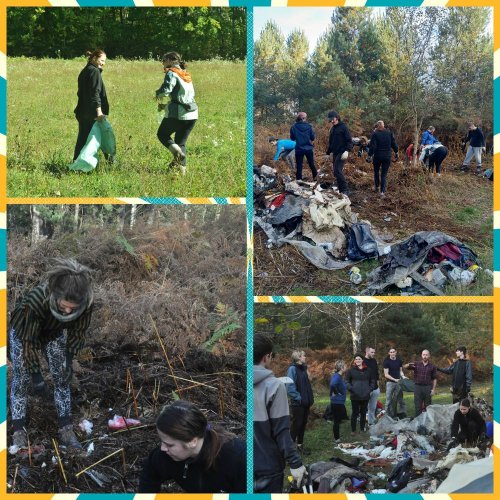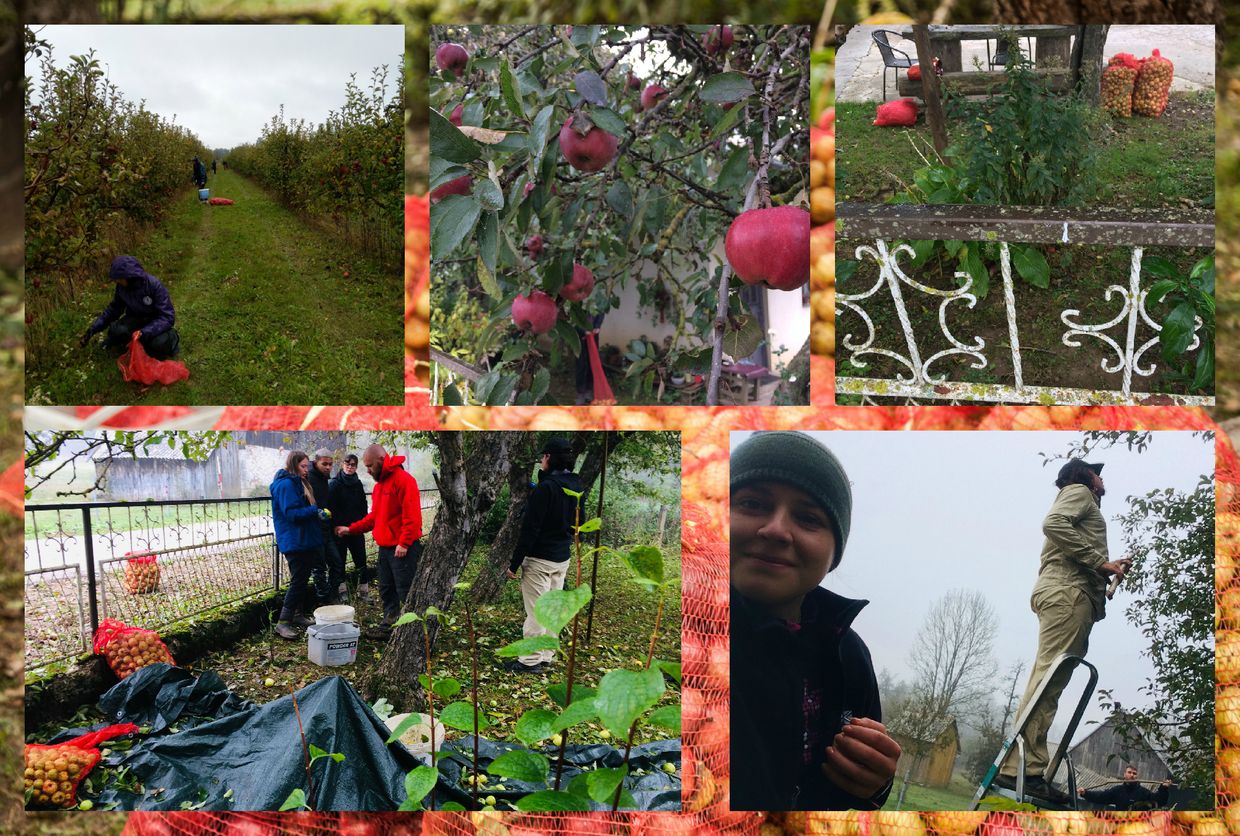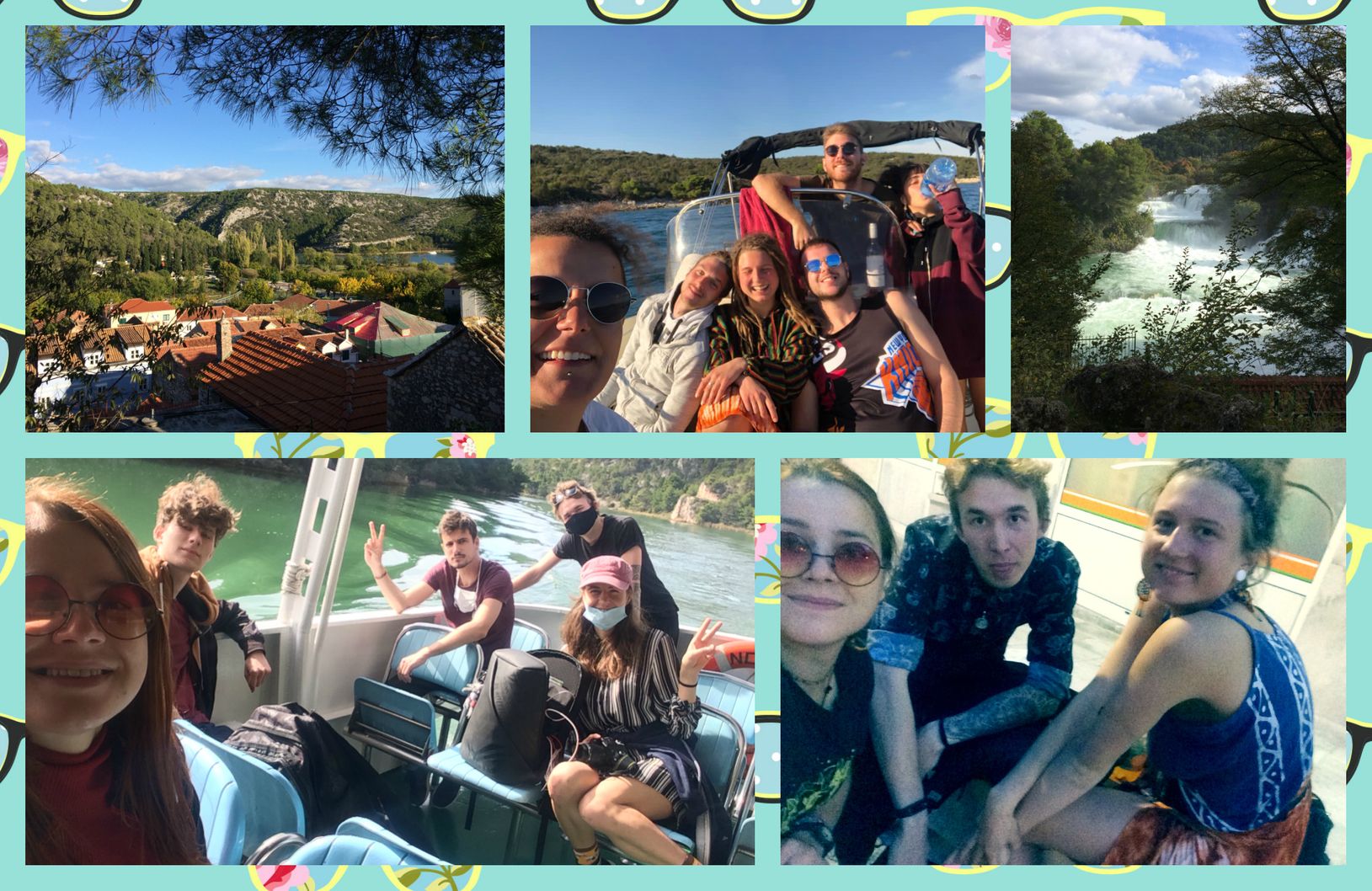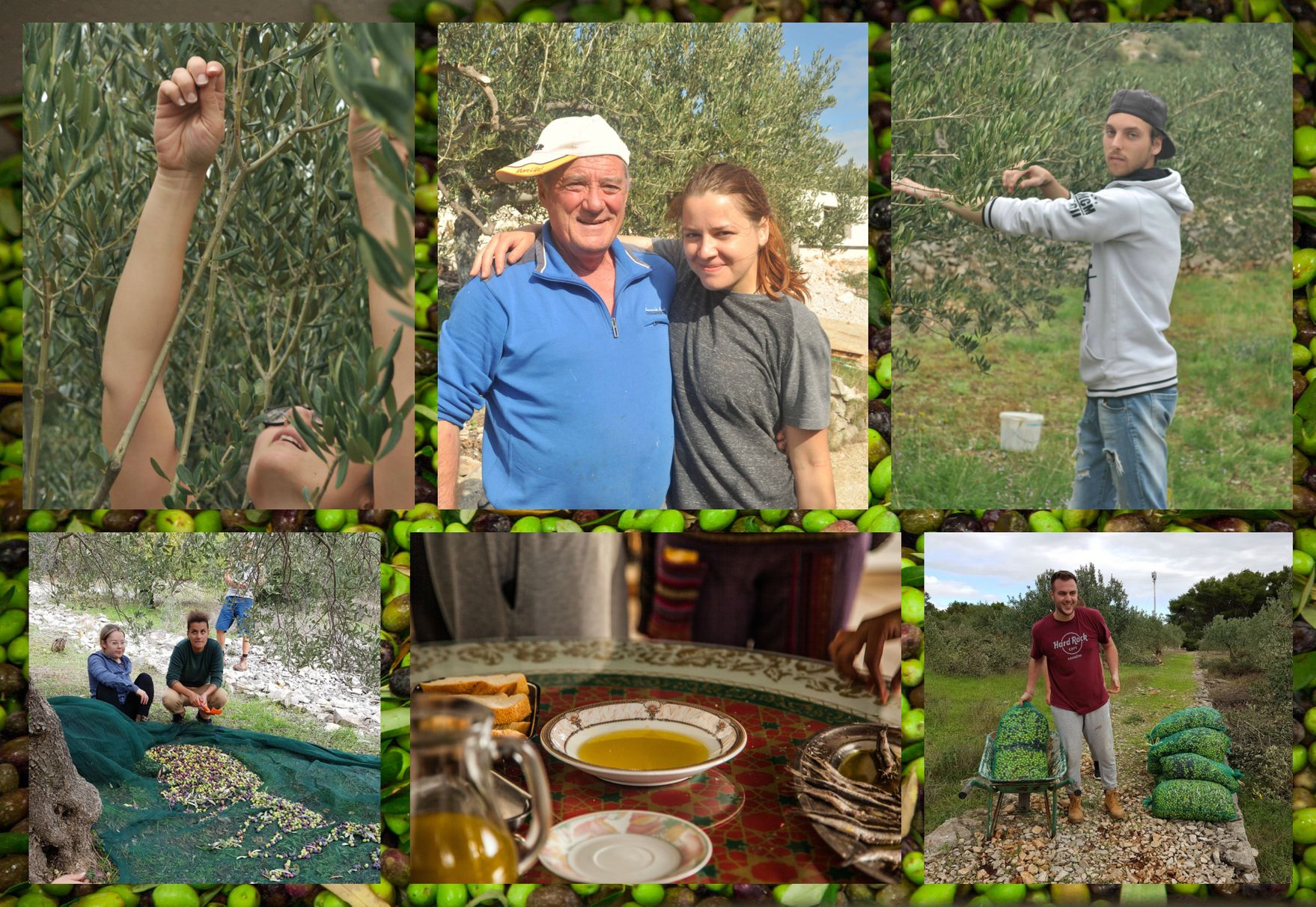
Service, Simplicity, Solidarity, Sustainability, and the Song IV
This is the fourth article of Tina's experience in her volunteering project in Croatia. The first article of Tina's adventure you can find here.
Nature, the Enjoyer and Consciousness
Forest Cleanup Oct 17-18, 2020
To avoid meeting villagers and farmers of Veliki Žitnik before we knew the Covid-19 test results, we had to make changes in our volunteering programme for the day, therefore we planned a big clean-up in the forest paths of Oteš. Equipped with trash bags, gloves, and shovels, we spent two sunny days cleaning up the mountain of all kinds of trash. People are so used to trash that most of us don’t think twice before throwing things away. We produce so much waste that even such a beautiful and environmentally and aesthetically valuable place as a forest is full of human-made waste.
On the first day, we took away trash from the surface and tried to get some from below the ground. The waste in the forest was building up for years, and so it has started to overgrow with weeds. We cleaned up the area from dry branches and weeds first. We then took away large pieces of waste, including the fridge, home furniture, suitcase, wooden boards, and tires. Smaller objects like metal cans, aerosols, children's toys, packaging, cups, and even kitchenware we bagged up, recycling if possible. Glass bottles and jars, broken window glass we separated from plastic items and other household and construction waste.
This activity was an eye-opening experience for us.
Plastic waste has very damaging effects on nature. Animals mistake plastic for food, eat it and die. When we leave it behind in nature, it starts to decompose, causing vulnerable chemicals to leak into the soil with harmful effects on the entire ecosystem of the forest.
As it got darker, we couldn’t carry on, though we came back the next day to pick up and take away the trash bags. The amount of trash we managed to collect and bag up was huge. And while most of us have been exhausted, we all felt good about volunteering to make the local forest paths both- enjoyable for people and safer for animals.
The amount of plastic that ends up on the streets, in the wild nature, in the soil and everywhere in the environment can be significantly reduced by going as much zero waste as possible. Be aware of what you’re throwing away, maybe it can get a new meaning and be useful for you or somebody else again. Get as little packaging as you can and recycle as much as possible, and encourage others to be conscious about items they buy and use on daily basis.
Volunteering for rural communities is as important as in urban areas
In the last few decades, because of technological innovation, social modernization, and globalization, many rural areas around Europe have faced dramatic changes and transformations such as population drop and the emigration of young people. The support for dealing with this change is often limited for rural communities, that’s why voluntary work has an impact on rural life. It’s important to say that long-term projects could benefit the local community of Veliki Žitnik more than the short-term project, as there was more, we could have done for the local community and the environment. Regardless of some circumstances, including the possibility of a covid-19 infected person in our group, raw weather, and lack of time, in my opinion, we did a good job.

In fact, to rural communities important is not just the work itself that volunteers provide but also the social connection, the sense of belonging, and the pride in their local area. I hope that we created good memories for the local people, had a positive impact on them, the environment, and the surrounding communities.
After ending activities in Veliki Žitnik, volunteers headed to Sumartin on Brač Island. Before that, we would spend four free days independently from the organization. We were free to decide what places in Croatia we wanted to see; how we travel, individually or in groups; and how we manage our resources and time.
Four days, five people, seven waterfalls.
On the day of leaving our temporary yet already loved home in Veliki Žitnik, some volunteers planned to explore the cities and national parks. Latvian team decided to pack backpacks and go hiking into the surrounding woods and hills. We spent the day admiring the natural wonder and exceptional views from the top of Rasovača hill.
In the search of adventure and cultural enlightenment, we hit the road and soon were on our way to Zadar, a city on Croatia’s Dalmatian coast. My Latvian team and I spent two days and nights in the heart of Adriatic exploring the cultural and historical heritage in the old town and admiring original and creative art pieces located all over the city. We drunk coffee in authentic and inexpensive places and tried all kinds of delicious, filling yet still affordable foods and snacks. We swam wherever there was safe water to swim in. We sailed yachts in the Adriatic Sea, let the warm Croatian wind blow through our hair meanwhile, the weather in Latvia was almost winterlike. In the night, we immersed ourselves in the music of sea waves with the “Sea Organ”, a so-called experimental musical instrument in Zadar. In the Krka National Park, we let drips of water from waterfalls fall on our faces, clothes, and cameras when walking along and capturing the beauty of waterfalls, paths, lakes, and forests. We also interacted with local people (always remembering to keep distance and wear masks for our own and the safety of others), telling them about our mission in Croatia. Shared our thoughts on the importance of solidarity, compassion, and concern about others in times of global uncertainty and solitude.

October 22nd, midday, half of the project was already behind us, although there was still one week to go and we looked forward to it. After two days in Zadar, we headed to Split, the largest city in the Dalmatia region. Important to say that as volunteers we were budget travellers and tried to spend the minimum amount of money, so the whole journey we mostly travelled by public transport, sometimes hiking or cycling. This time we took the bus from Zadar to Split, driving along the most breath-taking coastal road I have ever seen, with calm sky-blue water deep down below the road on the right, and on the left, marvellous cliffs standing still like protective guards for millions of years.
We spent two days in Split, enjoying the views from the Riva, the harbour of Split; swimming in the sea; rollerblading in the parks; exploring Diocletian’s Palace in The Old Town.
In four days during this little vacation, after volunteering in Veliki Žitnik before heading to Sumartin, we created a strong bond within our Latvian team, which was an incredible and invaluable experience for all of us.
Sumartin – the gentleness of olives and the wisdom of rocks
Three houses that hosted the team of 22 volunteers including 3 members from Outward Bond belong to local families. They are close to each other; we were always within walking distance and could easily gather for a meeting or exercise. All of the families that hosted us were very friendly and hospitable. The team had the chance to familiarise and interact with them, understanding the principles and the routes of their culture.
Thanks to members of “Outward Bond Croatia” and the Sumartin community, “The fruit of Solidarity” team had a 3-day volunteering experience of farm work in the picturesque fields of olive trees surrounded by beautiful and peaceful nature. Helping small family businesses harvesting olives has had a significant impact on the local community. Compared with commercial olive oil producers, farmers on Brač produce less, but the majority still hand-pick and press their olives, making oil of incredible quality. Although there are only around 500 000 olive trees on Brač Island, the local farmers produce the most olive oil in Croatia. On the first day, we picked olives, embracing instructions and advice from the farmers. We worked with enthusiasm even though it was the first approach to this process for most of us. Later that week, we learned about the olive oil making process and tasted it too. Croatian olive oil has a distinct fruity aroma with nice green colour, it’s delicious and healthy and widely used in Croatian cuisine for generations.

Community service in Sumartin also included helping the locals with renovating dry stone walls. Dry stone is a building method where nothing but stones are used to build walls, fences, and even small huts. It is very widely used in traditional architecture in the Mediterranean part of Croatia where it’s called “suhozid” or “gromače”. Before even coming to Sumartin, when travelling along the Adriatic coast in Croatia from Split to Makarska, I have noticed endless stone walls hugging hills and spreading all over the countryside. On Brač as other Croatian islands dry walls were built out of agricultural necessity long time ago and some are rock solid while others have crumbled into piles of stone. We planned to work three days on rebuilding walls in three different places. On the first day, volunteers made up two groups and worked on two different locations. My group and I helped a local farmer to fix the walls in the fields of olive trees. Originally the rocks that were used to build the walls were moved from the field to clear up the space to plant olive trees, these walls were built to divide territory and hold the soil. Reconstructing walls is a hard physical work for local farmers, as they have to move rocks and stones by hand, then shape them if possible before putting them together. It is very difficult to fit stones together so effectively so the wall could function without falling for years to come. Dry stone walling is quite a skill, that not a lot of people have these days, and we as volunteers had a chance to learn it. First, we had to clear the fallen wall and stack the rocks aside ranging by size; next we created a base from larger rocks, continuing by slotting the stones one next to the other without any adhesives, using bare hands as the only tool. As the wall grows in height it has to become thinner in width. As we learned during our voluntary service, the stones have to be selected and placed carefully to ensure stability of the wall.
The volunteers gave their best while working in the field. It was a beautiful experience where we were able to help the locals to keep the beauty of Croatia’s dry stone wall heritage.
We also developed or social and cultural skills through communication with drystone wallers, collaboration and team work within volunteers. Whenever we saw dry stone walls in Croatia we now understand and appreciate both the hard work that went into them and hardship endured to make them, because we participated directly in a reconstruction process. What especially made us happy that dry stone walls in Croatia are always made in harmony with the environment. The drystone walling technique itself is an example of harmonious relationship between people and nature.
In the end of the second week of the project, we got our certificates of participation, shared our thoughts, and evaluated the project and left the island the next day.
In the next article I will tell you about the importance of intergenerational work and, finally, about the SONG.
Tina
Project "The Fruit of Solidarity" is financed by the Erasmus+ Programme of the European Union.
This publication reflects only the viewpoint of the author.